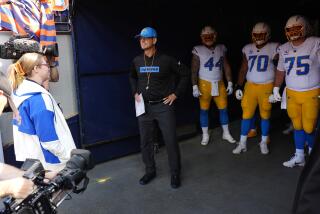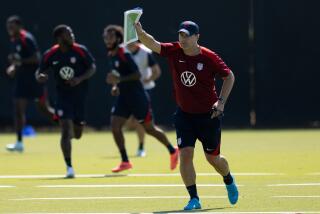The Biggest Loser in Hockey : Dallas Star Coach Hitchcock Has Dropped 260 Pounds While Gaining the Respect of Many Around NHL
- Share via
He was a heart attack waiting to happen, a mountain of man wearing a cloak of fat to hide the wounded psyche of the lonely child he used to be.
Six years ago, Ken Hitchcock, coach of the Kamloops Blazers, a junior team in Canada’s Western Hockey League, weighed 476 pounds and was a slave to his body. While rival coaches planned their power-play strategy, he worked on entering arenas when he couldn’t squeeze through the turnstiles. Once, after a player inadvertently knocked him down, he crawled back to the bench, on his hands and knees. He had to. He couldn’t get up.
Fans in one town threw Fruit Loops at him. In another, they waved wieners. In yet another, fans took his appearance as a cue to sing a fast-food restaurant’s theme song.
Insults seemed to bounce off him. He devoured entire pizzas while reviewing game tapes and took shopping bags full of junk food on the Blazers’ bus trips. The long, overnight rides would be punctuated by the sound of Hitchcock reaching into the bag for snack after snack.
Today, after two months as coach of the Dallas Stars, Hitchcock carries 215 pounds on a 5-foot, 11 1/2-inch frame. He expects to weigh 200 by May.
Thanks to a 1,000-calorie-per-day diet he devised, and a fiendish exercise routine, he’s less than half the man he used to be. But he’s every bit the diligent, successful coach he was when he won two WHL titles in Kamloops and earned division and conference championships with the Stars’ International Hockey League farm team in Kalamazoo, Mich.
“He’s been a good coach for a number of years,” said Dallas defenseman Darryl Sydor, who played for him in Kamloops. “But as an NHL team, your coach can’t be that big.”
Said Dallas center Joe Nieuwendyk: “There was a lot of talk about his weight loss when he first joined us, and he’s an inspiration.”
Hitchcock, 44, never worried that his obesity limited him professionally because he was happy where he was. He got his motivation to change in 1990, when his doctor warned him that he was on the road to serious health problems.
“There was a decision by me, not from a coaching perspective but from a lifestyle perspective, that I had to change the way I felt about myself,” Hitchcock said. “The only way to do that was to have a full commitment to losing weight, and the only way to do that was through diet and exercise.
“I did it for two years solid and dropped probably around 150 pounds. Then I took a 2 1/2-year hiatus where I lost weight on a very gradual basis. Last June, I stepped it up to another level and made the decision I was going to go the rest of the way. I’m in that process now.”
He shuns praise because it reminds him of where he was.
“What embarrasses me more than anything is the state that I got myself in,” he said. “I built this body and I’m going to have to unbuild it. When you’re busy living day to day, you don’t realize what you’re doing. When I look back at pictures of myself in the middle ‘80s I’m flabbergasted. . . .
“It’s a real good lesson for people. It’s like getting up and going to work in the morning. Taking care of yourself is an everyday thing too.”
He wasn’t a fat kid. Growing up in Edmonton, he was a good but lazy golfer. He swam and played baseball. In hockey, he was a promising center.
That all changed when his father died and his mother had to work outside the home. Without his father to take him to games or impose discipline, he foundered. Food became his solace.
“At 14, I was one of the best players on the [hockey] team I was playing on, with a bunch of 15- and 16-year olds,” he said. “At 16, I couldn’t even play as a defenseman on the worst team in the same league. That’s how much I had let myself go.”
Taunts didn’t bother him in high school. But when he was 20 and started coaching a team of 15- and 16-year-olds in the Edmonton suburb of Sherwood Park, the jabs hit home.
“I’d hear so many comments, like, ‘God, how does he skate?’ Or, ‘God, how does he tie his skates? What if he falls down? What if he has a heart attack during a game?’ . . .
“You build up an immune system mentally to it and shut those things off. . . . I’ll tell you one thing about overweight people. Their strength of mind is incredible, and most of the time it’s in a negative way, to be honest with you. If you could channel that strength of mind, it’s very, very, very strong and able to focus on other areas very quickly.”
For Hitchcock, the focus was coaching. He was 575-69 with Sherwood Park before going to Kamloops, in British Columbia. His patient, professorial style worked there too, and he coached a number of future NHL players--Sydor, Montreal’s Mark Recchi, New Jersey’s Scott Niedermayer and Vancouver’s Corey Hirsch. He was voted WHL coach of the year twice in six seasons.
His 291-125-15 record should have attracted interest from NHL teams, but his weight stood in the way. Not until he had dieted to about 315 did the Philadelphia Flyers hire him as an assistant coach, in 1990.
“After I got there, I felt that maybe there was another step I wanted to make [in losing weight],” he said. “But I never thought about it until I got there.”
Hitchcock spent three seasons with the Flyers but was swept out when General Manager Russ Farwell, who had hired him, was fired. Les Jackson, the Stars’ assistant general manager, hired him to coach Dallas’ top farm team.
His career and his life changed in Kalamazoo. While coaching there, he compiled a .624 winning percentage over two-plus seasons, the second-best in franchise history, and met Nancy Bruce, a TV producer and mother of three who recently became his fiancee. His professional triumphs continued when Bob Gainey, the Stars’ general manager and coach, decided in January to give up coaching and asked Hitchcock to take over.
For once, his appearance didn’t matter.
“I don’t know how much he weighed when we hired him,” Gainey said. “I don’t know what he weighs now. If he loses another 50 pounds, we’ll keep him. If he puts on another 50, we’ll keep him too.
“The reason we brought him in is, we thought he had really good skills to work with our younger players. He also had good coaching skills, and it was a natural progression for him, from coaching youth, to juniors, to an NHL assistant coach, to head coach in the minors, to the NHL.”
It hasn’t been an easy move. Gainey molded the Stars into a low-scoring, defensive team. Hitchcock brought in a more open style. The Stars were 11-19-9 under Gainey and 0-4-1 in their first five games under Hitchcock until he settled in.
A 5-0-1 run vaulted them back into the Western Conference playoff chase in early March, but their feeble offense sabotaged their hopes. They’re 24-37-13, eight points behind eighth-place Winnipeg.
“The team was playing well but losing, and my first thoughts coming in were, you tweak a couple of things, make a couple of changes, and away you go,” Hitchcock said. “I was wrong. There’s a fine line between winning and losing and a lot of emotion is spent when you lose close games like that. We had to get our enthusiasm and emotion back, and that’s taken a lot of work.”
His approach won over Nieuwendyk, the veteran center acquired from Calgary in December.
“He’s extremely focused,” Nieuwendyk said. “He really cares about your game and about the team. Things were a little lackadaisical and he stepped in and straightened things out. He’s done a tremendous job.”
Said Mike Modano, Dallas’ top scorer: “It wasn’t pretty two months ago, but we’ve made some changes and they’re for the best. [Hitchcock] makes everyone accountable. . . . He’s been around winners wherever he’s been, and he knows what it takes to win.”
Obviously, he also knows what it takes to lose--but still be triumphant.
More to Read
Go beyond the scoreboard
Get the latest on L.A.'s teams in the daily Sports Report newsletter.
You may occasionally receive promotional content from the Los Angeles Times.







